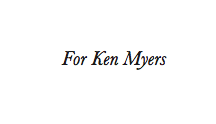The Dissolution Of The Real

For years on this blog, I’ve praised the quarterly Mars Hill Audio Journal and its host Ken Myers for producing what I regard as absolutely the best resource for intelligent, culturally engaged Christians trying to make sense of modernity. In fact, everything I write in The Benedict Option is at best a book-length series of footnotes to the work Ken has been doing on the Journal since 1993. It’s the kind of thing I want to take every smart Christian I know by the shoulders and say, “You have to subscribe to this thing!” I feel so strongly about what the Journal means to the church today that these are the words on the dedication page in The Benedict Option:

While the academic left are planning to have a series of “teach-ins” on Inauguration Day to talk about the Meaning Of Trump, and to plot their “resistance” to him, I hope that thoughtful Christian conservatives will gather and listen to selections from the powerful interview series Ken did during the fall campaign on how to think theologically about politics. You don’t have to be a Mars Hill subscriber to hear the interviews, though they certainly give you a great idea about the form and content of the Journal‘s interviews.
While driving, I was listening today to the interview with philosopher of science Michael Hanby, and I almost wanted to pull over on the side of the road and take notes. I’ll recall a little bit here for you.
Hanby says the choice we faced in last fall’s election reveals the “despair” of people living in liberal democracy now. What we’re struggling with now is that we can all see the great weaknesses of liberalism (meaning the current political order), but we can hardly see beyond its horizons to the cure. That is, liberalism has been extremely successful at eliminating alternatives, but that doesn’t mean that it’s a success.
“Even though I would argue that liberalism is exhausted and doesn’t work, it’s with us as far as the eye can see — and the fact that the eye can’t see very far is part of the problem,” Hanby says.
Hanby calls liberalism “the political form of a technological view of reality, of a mechanistic understanding of nature.” Political philosophy presupposes a view of reality and of human nature. Our technological order sets the basis for our political order. What, then, is “a technological view of reality”? According to Hanby, it’s a way of construing the world according to technological criteria.
“We don’t simply know nature for the sake of control, but we know it by controlling it,” Hanby explains.
In the technological view, “truth” becomes “what works,” or “what is technologically possible.” The problem with this, says Hanby, is that we can only discover the ultimate limits of possibility by transgressing current limits. He says, “Technological society has within it a permanent revolution as a way of viewing the world.”
What does freedom mean in technological liberalism?
First, says Hanby, the US Constitutional order presupposes the modern view of reality and nature. In that view of nature, there was no such thing as intrinsic order built into reality. There is no ultimate meaning to things beyond what we choose to impute to them. Freedom, then, becomes not, as in the classical and medieval world, about having and exercising the power to live out the good, but rather about acquiring and utilizing power to enforce one’s will.
“The view of freedom that we have enshrined in our political order corresponds to our view of the natural order. They reinforce each other,” says Hanby. “In effect, the state leaves us free to transgress these limits.”
“Possibilities are more beguiling than what’s actual,” says Myers. “That’s the modern mentality.”
“It’s the essence of the modern mentality,” replies Hanby.
In modernity, says Hanby, the state “exists to protect me from the claims of reality.”
“What happens then is in the name of protecting freedom [the state reserves] the right to define, or define away, reality.”
What’s the classical Christian understanding of the world, and how does it differ from the modern, technological view of the world? The simplest way to answer that, says Hanby, is this:
Your final philosophical options come down to two. Either there is a word, or a logos, at the foundation of reality, so that reality is inherently intelligible and meaningful, and therefore there are natures, forms, that persist in spite of the flux of history and time; or, reality is fundamentally meaningless, and meaning is kind of an epiphenomenal construct superimposed upon it.
If reality is inherently meaningless, says Hanby, then the only important things to know about them is how they came to be, what they are capable of doing, and what we can do with them. The logic of this process is to create an order undergirded by a view of reason “that cannot even think about what things are.”
This, says Myers, results in the conviction that politics is about nothing but power, and that one should do whatever one can to acquire power. This, he says, is something that many Christians have fallen into in their support of Donald Trump: you know, the idea that he may be a bad man, but at least he’s on our side.
Anyway, there’s a lot for Christian conservatives (and, in fact, all social and religious conservatives) to talk about in that Mars Hill series. What Hanby’s interview brought to my mind is the contention by some commenters on this blog that the politics of transgender is nothing but a distraction from “what really matters.” Nothing could be farther from the truth.
As Hanby points out early in the interview, we now find ourselves in a world in which things that were given — maleness and femaleness, sexual complementarity as normative, the traditional family, and so forth — no longer are. The most radical of these things is the concept that male and female have nothing to do with biology, that they are conditions chosen by individuals, as they will.
A political and social order that normalizes transgenderism is one that accepts the technological view of reality — which is to say, that there is no such thing as inherent meaning, not even in biology. We are free to do whatever we want to nature. The thing is, it’s a lie. But if the state reserves to itself the right to control the definition of reality for the sake of protecting freedom, so construed, we are well on our way to tyranny.
The point I tried to make to fellow conservatives, including Christians, a decade ago regarding same-sex marriage was that legalizing and normalizing same-sex marriage required adopting a view of marriage and family that was unstable, and not rooted in anything other than human will. It was a monumental leap, for reasons I discuss at greater length in this essay. Transgender is even more categorically radical, because it denies biology entirely, and says that male and female depend entirely on the subjective psychological state of the individual. And it requires that we change the law, and even the language, to accommodate this view. It’s all in Justice Kennedy, ca. 1992: “At the heart of liberty is the right to define one’s own concept of existence, of meaning, of the universe, and of the mystery of human life.”
That sounds like common sense to most of us. And that is precisely the problem. There is buried in that statement the idea that there is no such thing as truth.
There’s a lot of talk today about how we live under “post-truth politics.” What I wish Christians would contemplate going forward is that this is not an aberration of liberalism, but is rather the fulfillment of it.
What do we do, then? You know my answer: whatever we can to build citadels around the truth, so that it might survive this age of darkness.
Subscribe for as little as $5/mo to start commenting on Rod’s blog.